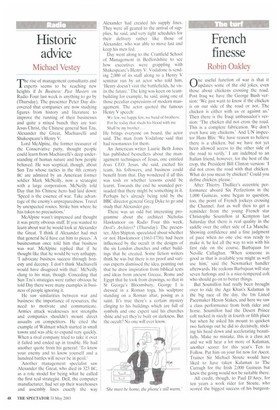Historic advice
Michael Vestey
rr he rise of management consultants and experts seems to be reaching new heights if In Business: Past Masters on Radio Four last week is anything to go by (Thursday). The presenter Peter Day discovered that companies are now studying figures from history and literature to improve the running of their businesses and quite a mixed bunch they are too: Jesus Christ, the Chinese general Sun Tzu, Alexander the Great, Machiavelli and Shakespeare's Henry V.
Lord McAlpine, the former treasurer of the Conservative party, thought people could learn from Machiavelli's deep understanding of human nature and how people behaved. He was sceptical, though, about Sun Tzu whose tactics in the 4th century BC are admired by an American former soldier Mark McNeilly, now a strategist with a large corporation. McNeilly told Day that his Chinese hero had laid down: 'Speed is the essence of war. Take advantage of the enemy's unpreparedness. Travel by unexpected routes. Strike him where he has taken no precautions.'
McAlpine wasn't impressed and thought it was pretty obvious stuff. If you wanted to learn about war he would look at Alexander the Great. 'I think if Alexander had met that general he'd have cut him to pieces.' A businessman once told him that business was war. McAlpine replied that if he thought like that he would be very unhappy. 'I advocate business success through honesty and decency. I don't think Machiavelli would have disagreed with that.' McNeilly clung to his man, though. Conceding that Sun Tzu's strategies were rather obvious he told Day there were many examples in business of people ignoring it.
He saw similarities between war and business: the importance of resources, the need to motivate and communicate. Armies attack weaknesses not strengths and companies shouldn't mount direct assaults on competitors. He cited the example of Walmart which started in small towns and was able to expand very quickly. When a rival company tried to take it over it failed and ended up in trouble. He had another quote from his general: `To know your enemy and to know yourself and a hundred battles will never be in peril.'
Another management specialist saw Alexander the Great, who died in 323 BC, as a role model for being what he called the first real strategist. Dell, the computer manufacturer, had set up their warehouses and assembly lines exactly the way Alexander had created his supply lines. They were all geared to the arrival of supplies, he said, and very tight schedules for their delivery rather like those of Alexander, who was able to move fast and keep his men fed.
Day went along to the Cranfield School of Management in Bedfordshire to see how executives were grappling with Shakespeare's Henry V. Vodafone is sending 2,000 of its staff along to a Henry V seminar run by an actor who told him, 'Henry doesn't visit the battlefields, he visits the future.' The king was keen on teambuilding for example, he said, using one of those peculiar expressions of modern management. The actor quoted the famous Henry V speech: We few, we happy few, we hand of brothers; For he today that sheds his blood with me Shall be my brother. ...
He brings everyone on board, the actor said. The man from Vodafone said that had resonances for them.
An American writer Laurie Beth Jones has published bestsellers about the management techniques of Jesus, one entitled Jesus CEO. Jesus, she said, excited his team, his followers, and business could benefit from that. Day wondered if all this was tosh or whether lessons could be learnt. Towards the end he sounded persuaded that there might be something in it. Perhaps he's already being told by the BBC director general Greg Dyke to go and study that Alexander guy.
There was an odd but interesting programme about the architect Nicholas Hawksmoor on Radio Four this week, Devil's Architect? (Thursday). The presenter, Alyn Shipton, speculated about whether or not Hawksmoor (1661-1736) had been influenced by the occult in the designs of the six London churches and other buildings that he created. Some fiction writers think he was but there is no proof and various experts dismissed the idea, pointing out that he drew inspiration from biblical texts and ideas from ancient Greece, Rome and Egypt that he took from drawings, so that in St George's Bloomsbury, George I is dressed in a Roman toga, his sculpture standing on a Roman altar, posing as a saint. it's true there's a certain mystery clinging to his buildings which are full of symbols and one expert said his churches shine and yet they're built on darkness. But the occult? No one will ever know.


































































 Previous page
Previous page